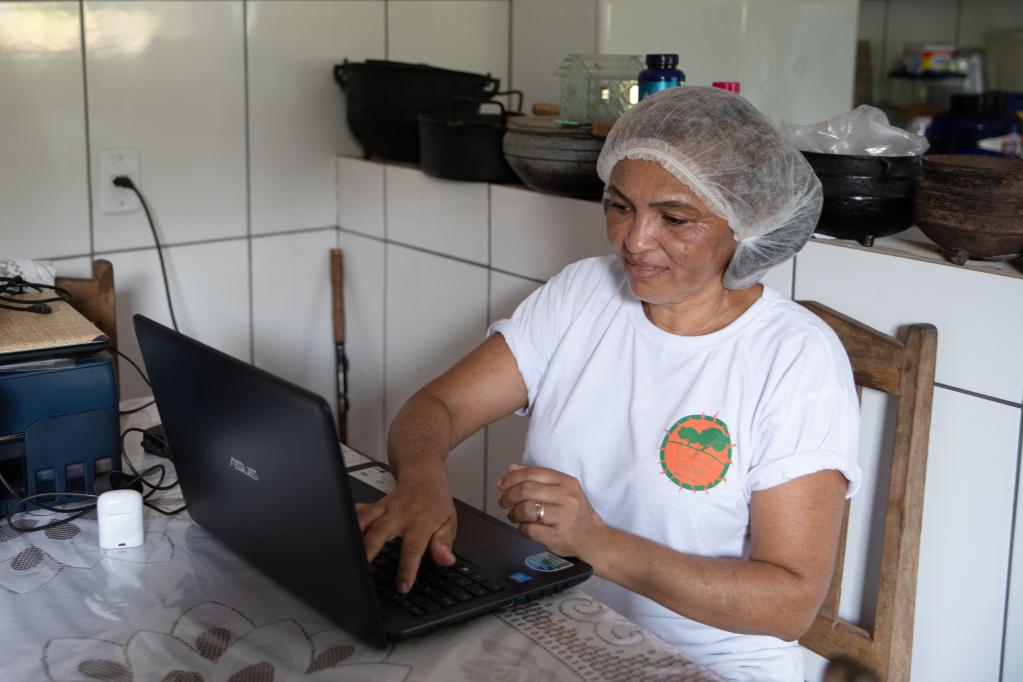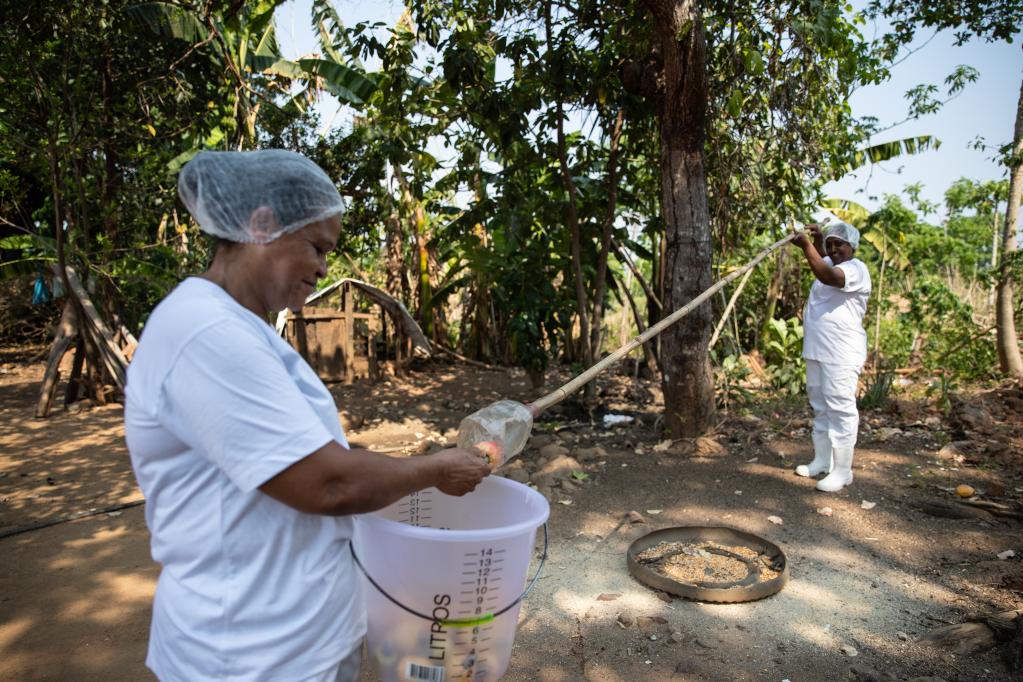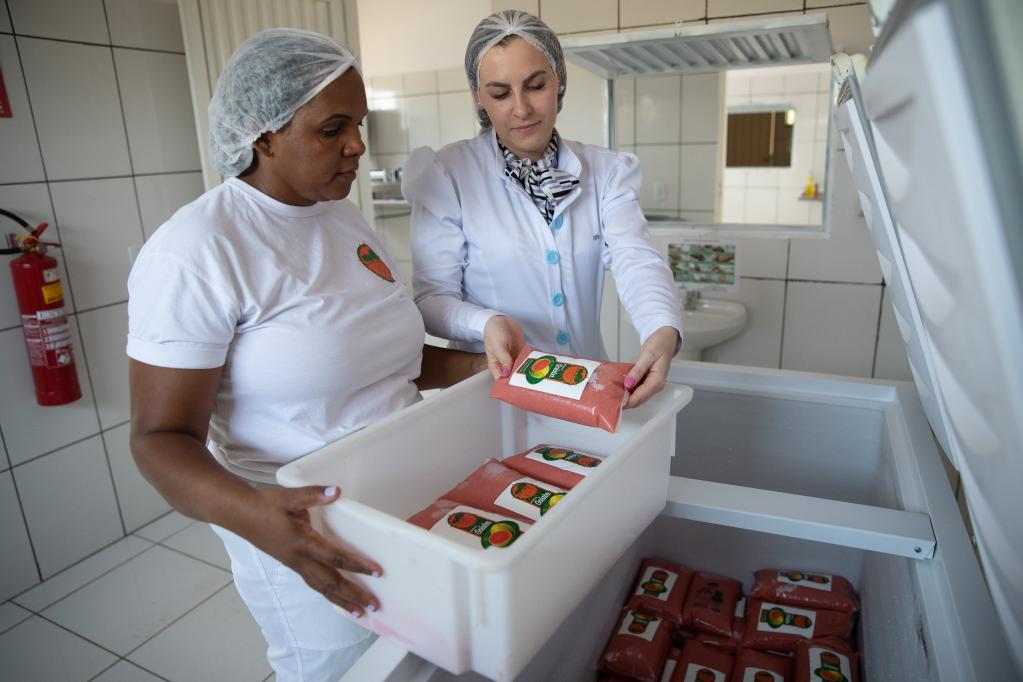Global Connection | A Chinese enterprise project has brought great changes to this poor village in Brazil.
Xinhua News Agency, Dinia, Maria, Brazil, November 21st (Reporter Zhao Yan, Chen Weihua) In the northern Brazilian state of Tocantins, there is a small village named Maria Dinia, which was settled by slaves who escaped from slavery (Kirombo people). Now the villagers are all descendants of the "runaway slaves". Similar villages are usually located in dense forests or wilderness with inconvenient transportation, and people live in poverty.
However, since last year, with the official operation of a fruit processing factory, the life of women in Maria Dinia village has changed greatly. Malena, a villager, recently sat on a new sofa at home and told Xinhua News Agency about the change of his life.
"Life changes before and after work can be described from white water to red wine." Malena said, "I used to be a housewife, but I have a job since last year. Now, I have bought a sofa and a refrigerator with the money I earned, and I can buy a mobile phone without installment. The exterior wall of my house has also begun to be painted with cement. It can be said that my dreams have come true one by one. I also connected to the Internet at home, and I learned to contact business, purchase and sell online. " Malena kept talking while showing the reporter around his home.

On October 4th, 2022, in Dinia, Maria, Tocantins, Brazil, Malena, a worker of a fruit processing factory, used a newly bought computer at home. Xinhua News Agency reporter Wang Tiancong photo
The fruit processing factory where Malena works was sponsored by State Grid Brazil Holding Company of China, which belongs to a project of the company’s basic environmental protection plan. At present, there are 10 workers, 9 of whom are women.
Anne De Amorim, coordinator of State Grid’s environmental, social and corporate governance, told reporters that during the construction of the second phase of the power transmission and transformation project of Meilishan Hydropower Station, Brazil’s second largest hydropower station, because the transmission line passed near the village, the builders talked with the villagers and learned that there were a large number of fruit trees in the area, and the villagers wanted to build a fruit processing factory, but the local water quality was not good. Therefore, State Grid Batong decided to help the village drill two wells, which can not only provide high-quality water, but also build a fruit processing factory.
De Amorim said: "After hard work, we got the environmental protection permission to build the factory and incorporated it into the company’s basic environmental protection plan. We hope that through this project, the village can achieve sustainable development. "

On October 4, 2022, in Maria Dinia, Tocantins, Brazil, workers picked fruits. Xinhua News Agency reporter Wang Tiancong photo
In November 2018, State Grid Batong helped the village to complete the construction of the factory building. Since 2019, villagers have been trained from picking fruits to using machines. At the beginning of 2021, the factory obtained a business license and officially put into operation in August of the same year. The pulp produced by the factory comes from acerola cherry, mango, pineapple, passion fruit and other local fruits.
Graciela Paludo, a food engineer, is an expert contracted by State Grid Pakistan Control to teach local villagers how to make fruit pulp. She trained villagers in fresh fruit preservation, fruit processing, standardized packaging and shelf life control, and also helped them contact buyers.
"Although the road here is not easy and it will take a long time, it is all worth it." Paludo said, "Because I see that they are no longer dependent on their husbands and can support their families through labor. They are women, blacks, Keelung people, far away from the city, and almost forgotten by society, but now they have become the pillars of their families. I am proud of them."

On October 4, 2022, in Dinia, Maria, Tocantins, Brazil, food engineer Graciela Paludo (right) worked with workers. Xinhua News Agency reporter Wang Tiancong photo
The fruit processing factory produces "Keelung Orchard" brand fruit pulp. Brazil’s national supply company has signed a contract with the factory to make this brand of fruit pulp available for primary school students in public schools to drink during meals. In addition, the factory also signed contracts with some hotels and private institutions for supply. The average annual income of workers in fruit processing plants can reach 8,000 reais (about 11,000 yuan).
Due to the large temperature difference between day and night in the wooded grassland where Maria Dinia village is located, it is beneficial to sugar storage, and the fruit pulp tastes good, and the product market will open soon. When the order is large, it is necessary to buy fruits in the nearby market to supplement it. Therefore, Malena wants to plant some more fruit trees in his own land.
"I only thank China enterprises! We hope that the scale of the factory will become larger and larger, and the products will be sold farther and farther. I believe that as long as there is a desire, it will be realized through hard work. " Malena said. (Clip: Wang Yujue; Editor: Yang Aihua, He Mengshu, Jia Xiaohua, Shang Jing, Qian Yong Wen)
Produced by Xinhua News Agency International Department
Produced by Xinhua News Agency’s International Communication Integration Platform